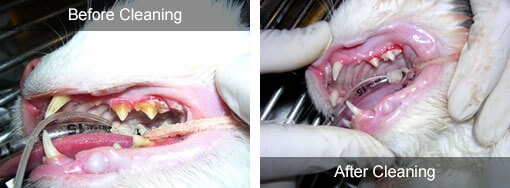(Why All This Talk About Brushing and Cleaning?)
You may have noted a increased emphasis on dental health for your animal companions in recent years. The importance of clean and healthy mouths is continually brought home to us, especially as our animal friends age, since dental health affects far more than just the teeth and gums.

Gingivitis and periodontal disease may spread to the urinary tract, heart valves, and other systems of the body. Inflammation of the gums and bone around the teeth can result in an elevation in inflammatory proteins and cells in the bloodstream, chronic stimulation of the immune system, and a decreased willingness to eat hard food. It may also cause bone loss, leading to the loosening and eventual complete loss of teeth.
Finally, oral pain or discomfort may decrease the quality of your pet’s life, affecting his/her willingness to groom and play. In fact, your pet’s dental health may even affect the quality of your life: those kisses smell pretty nasty when your pet has a simmering inflammation!
It’s essential to condition puppies and kittens to be comfortable with the handling of their lips and mouths at an early age. We encourage clients to brush their pets’ teeth and gums often, daily if possible. Brushes for both dogs and cats are available, in addition to a variety or toothpastes and mouth rinses/sprays. Some dogs find a piece of gauze or a small cloth— wrapped around the owner’s index finger — more palatable (so to speak!) than a brush; likewise, some cats prefer a Q-Tip.
For those of you who hardly have time to brush your own teeth, let alone your pet’s — or who want a supplement to brushing — consider the use of a special diet. For example, Science Diet T/D is a food that has been formulated into large kibbles for cats and dogs; the large size of the kibbles requires that pets use their molars in order to swallow. Since the T/D is rather high in calories, it is best used as a daily snack, rather than as a maintenance diet.

When tartar builds up and gingivitis is a risk, a thorough dental cleaning is recommended. The procedure consists of removal of tartar both above and below the gum line, evaluation of each tooth’s root, polishing, and the application of a fluoride foam to all the teeth.
If a fractured or infected tooth is discovered, removal may be necessary. While recent advances in endodontics mean that more marginal teeth may be saved, extraction often offers rapid relief to a pet with oral pain. In these cases, our patients are often given an antibiotic injection during the cleaning to prevent a “shower” of bacteria through the bloodstream. Sometimes it is also necessary to send antibiotics home with the pet as well.
Maintaining the dental health of your pet is a critical factor in helping him/her live a long and happy life. A small commitment on your part can make a big difference!
